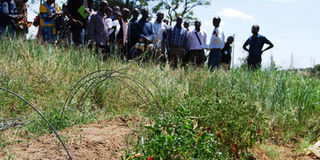Prime
Dairy farmers advised on climate smart farming

Farmers visiting a chilli demonstration garden at Mbarara ZARDI during the Monitor Seeds Of Gold Farm Clinic. Photo by Perez Rumanzi.
MBARARA.
Dr Constantine Kato, an expert from Makerere University Agriculture and Research Institute-(Kabanyoro), has urged dairy farmers not to put emphasis on only food security and improved livelihoods but also consider the negative impact of faming on the environment and reduce them.
Speaking to farmers at Daily Monitor Farm Clinic at Mbarara Zonal Agriculture and Research Development Institute in Mbarara on Saturday, Dr Kato said they should stop deforestation done while clearing farms and should feed cows properly so that they don’t emit a lot of greenhouse gasses to the atmosphere.

Katongole explaining to farmers.
“Climate smart farming is about ensuring food security and improved livelihoods. In most cases farmers forget the other side of climate smart farming and they only look at have they improved their livelihoods; do they have enough food and milk at home. But they forget animals impact the environment, when the environment is affected it impacts the dairy farming,” said Dr Kato.
He added that climate smart agriculture should be one that produces for food security and improved livelihoods while ensuring climate change mitigation (reduction) and adaptation.
“Climate change mitigation involves reducing ways through which farming practices are affecting environmental- like emission of greenhouses gasses and deforestation. You get climate smart feeds and breeds; those that can withstand. Plant legumes and make silage. Feed cows that emit less greenhouse gasses or feed them properly so that they don’t a lot of greenhouses gasses.”



